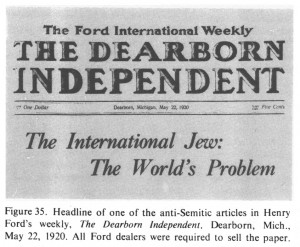I had posted earlier about Walter Sinnott-Armstrong’s book Morality without God, an atheist attempt to develop an ethical system of morality without any appeal to God or religion. I have now finished reading and studying the book. There were several good points made in the book. Most of the time that I agreed with him he was criticizing something in Christianity that I don’t view as true biblical Christianity (i.e., his attacks upon Roman Catholic dogma). I also believe that his book is good in the sense that it helps true Christians know that atheists do think about morality. Sinnott-Armstrong presents the best case for atheist ethics that I have seen although, of course, as a Christian I have serious disagreements with him on almost every page of his book.
New Atheism and Morality
Mar 16
Zeal for Zion
Mar 14
 I have just finished my reading of Shalom Goldman’s excellent book Zeal for Zion: Christians, Jews, and the Idea of the Promised Land (UNC Press). Goldman is professor of Hebrew and Middle Eastern studies at Emory University. I had made an earlier post on it in my earlier stages of reading. While I think there are times when he is off in his assessment of various relationships and his portrayal of various theological views, on the whole he has provided an excellent outline of the historical convergence of Christian forms of Zionism and Jewish forms of Zionism since the late 1800s. Perhaps the primary contribution he makes to the history of Zionism is to show that it is not a monolithic movement. While this has been recognized on the Jewish side, on the Christian side it has been assumed in some circles (popularly?) that modern dispensationalism, which is Zionist by its very nature, is the only Christian form of Zionism. This came home to me a few years ago at the Evangelical Theological Society. Tommy Ice, a dispensationalist responder, pointed out to the main speaker Timothy Weber, that in his analysis (see Weber’s book On the Road to Armageddon) he assumed that all Christian Zionists were dispensationalists, when such is not the case. Goldman’s book helps to support Ice’s conclusion and critique.
I have just finished my reading of Shalom Goldman’s excellent book Zeal for Zion: Christians, Jews, and the Idea of the Promised Land (UNC Press). Goldman is professor of Hebrew and Middle Eastern studies at Emory University. I had made an earlier post on it in my earlier stages of reading. While I think there are times when he is off in his assessment of various relationships and his portrayal of various theological views, on the whole he has provided an excellent outline of the historical convergence of Christian forms of Zionism and Jewish forms of Zionism since the late 1800s. Perhaps the primary contribution he makes to the history of Zionism is to show that it is not a monolithic movement. While this has been recognized on the Jewish side, on the Christian side it has been assumed in some circles (popularly?) that modern dispensationalism, which is Zionist by its very nature, is the only Christian form of Zionism. This came home to me a few years ago at the Evangelical Theological Society. Tommy Ice, a dispensationalist responder, pointed out to the main speaker Timothy Weber, that in his analysis (see Weber’s book On the Road to Armageddon) he assumed that all Christian Zionists were dispensationalists, when such is not the case. Goldman’s book helps to support Ice’s conclusion and critique.
 In earlier posts, I mentioned Tom Krattenmaker’s article “What if the end isn’t near?” (USA Today in August 2010). It is largely a criticism of the pretrib view of the rapture and the alleged motivation such a view is toward inaction on the part of the Christian in the world to engage social problems, etc. In my first post, I listed some concerns which I began to flesh out briefly in other posts. I have provided them below. In this post, I want to finalize my initial analysis.
In earlier posts, I mentioned Tom Krattenmaker’s article “What if the end isn’t near?” (USA Today in August 2010). It is largely a criticism of the pretrib view of the rapture and the alleged motivation such a view is toward inaction on the part of the Christian in the world to engage social problems, etc. In my first post, I listed some concerns which I began to flesh out briefly in other posts. I have provided them below. In this post, I want to finalize my initial analysis.
1. How many pre-trib Christians hold different views of nuclear weapons and environmentalism from the author’s because of factors other than biblical views of the end times;
2. The generous use of overstatement throughout the article;
3. Unwarranted assumptions and limited options that are sometimes given (why are there only two futures? why not 3 or 4? are we really dealing with all the possibilities?);
4. The false charge of fatalism in light of the true nature of the doctrine of imminency;
5. The use of fringe views or minority views instead of scholarly and thoughtful presentations of the pre-trib perspective;
6. As a corollary to # 5, the futurism of the pre-trib view which does not allow for predictions of the future in a true pre-trib perspective. In other words, the article seems to be unaware that it is being critical of historicist misrepresentations of the pre-trib perspective rather than the pre-trib perspective itself.
7. As a corollary to # 1, the idea that the article (may) assume that current political environmentalism is what the Bible teaches about care for the created order.
To begin, I want to make some remarks about unwarranted assumptions and limited options that are given in Krattenmaker’s article. This is demonstrated at the very outset of the article. Citing Tyler Wigg-Stevenson (favorably), Krattenmaker says “he sees two futures. In one, the world has rid itself of nuclear weapons. In the other, the world has been destroyed by them.” These two options appear to be the thrust of the title of Wigg-Stevenson’s organization the Two Futures Project. It is quite appropriate for someone to voice his view of the dangers of nuclear weapons. I have absolutely no problem with that. All wars are to be avoided if at all possible, not just nuclear ones. However, is the opinion that these are the only two options (world-wide destruction or no nukes exist) a wise one to possess on such a critical issue? Is there no middle position that is possible? Why craft the issue in these stark terms? One must live in reality not in a dream world. It is not at all a sure conclusion that the world will destroy itself with nuclear weapons if they are allowed to exist. It is certainly a theoretical possibility. However, it is not an inevitable one. One cannot assume the world-wide catastrophic end when the next nuke is used (although some pretribs do hold this view). Of course, this view could be seen as playing it safe to prevent the catastrophe. Unfortunately, in a fallen world this may not be appropriate. If evangelicals rose up to be against nuclear weapons and helped lead America to unilaterally destroy all their nuclear weapons, it is not at all assured that the same would be true of other parts of the world. A wise use of nuclear weapons as deterrents has been quite effective for decades in preventing catastrophe and/or servitude.
 I have often contrasted the French Revolution and the American Revolution and their outcomes. The French Revolution did not emphasize the depravity of man while the American Founding Fathers had a healthy respect for the biblical teaching of depravity. Even though all men are made in the image of God, the depravity of the human race is a reality that must be taken into account if government organization is to mimimize the possiblity of corruption. Hence our Founding Fathers designed a system of checks and balances to make sure that power is not consolidated in one man or one group of men. This in turn helps to protect the God-given liberties that men possess. In this regard I ran across a statement by George Washington quoted in Peter’s Lillback’s George Washington’s Sacred Fire: “the blessed religion revealed in the Word of God will remain an eternal and awful monument to prove that the best Institutions may be abused by human depravity” (see p. 58). Not only does this show a concern with the biblical doctrine of depravity, it is fairly prescient about what was to come in American life.
I have often contrasted the French Revolution and the American Revolution and their outcomes. The French Revolution did not emphasize the depravity of man while the American Founding Fathers had a healthy respect for the biblical teaching of depravity. Even though all men are made in the image of God, the depravity of the human race is a reality that must be taken into account if government organization is to mimimize the possiblity of corruption. Hence our Founding Fathers designed a system of checks and balances to make sure that power is not consolidated in one man or one group of men. This in turn helps to protect the God-given liberties that men possess. In this regard I ran across a statement by George Washington quoted in Peter’s Lillback’s George Washington’s Sacred Fire: “the blessed religion revealed in the Word of God will remain an eternal and awful monument to prove that the best Institutions may be abused by human depravity” (see p. 58). Not only does this show a concern with the biblical doctrine of depravity, it is fairly prescient about what was to come in American life.
Covenant theologians have long been sensitive to being charged with anti-Semitism. Recall the discussions about the Knox Seminary Open Letter and my response to it which can be found here in the eschatology section of the drop-down menus (click on systematic theology to get to eschatology). However, it seems that dispensationalists are also occasionally charged with being anti-Semitic. Apparently, no one in the evangelical world is immune to the charge.
Often I see the name Arno C. Gaebelein come up in such disucssions. I am well-versed in Gaebelein’s life and work since I did my Ph.D. dissertation on him. But I continue to be amazed at the misinformation that is broadcast about him on many fronts, including his attitudes about Jews. To be sure, in my dissertation I analytically criticize him on many fronts as any dissertation writer would do. In my case, it was a focus on Gaebelein’s theological method although I also get into the life influences upon Gaebelein and his attitudes about the Jews.
The unrest in the country of Egypt is a concern for all of us. It has the potential of altering our lives if gas prices are somehow affected. It could also veer off in an anti-Israeli direction which will not help the Arab-Israeli conflict in the Middle East. This humanly speaking can have disastrous impact on the world at large.
Egypt also has a role in Bible prophecy at several points. The king of the south in Daniel 11 for example may well be the leader of Egypt as some interpreters hold. Usually, however, when current events like this occur, there are those who will overstate the implications for prophecy. We won’t know the ultimate implications for prophecy until the end-time events (rapture, tribulation, Second Coming, kingdom) begin to occur. So, please refrain from overstatement in this area and stick to biblical teaching about Egypt in the latter times.
USAirways and Genesis
Feb 2
 I am a Dividend Miles member of USAirways’ frequent flyer program. I currently have around 50,000 miles. So I travel often, usually on USAirways. Last week I was flying to West Virginia to do a lectureship at Appalachian Bible College. The USAirways magazine in the seat pocket in front of me (for January 2011) had a published excerpt from John Coates’ book Original Sinners. That particular book trashes the literal approach to Genesis and the excerpt which was published was fairly clear. The view itself is not surprising in light of the unbelieving culture in which we live. The author has a right to express his views. But what is surprising is that USAirways decided to step into the arena of religious views to trash the literal understanding of creation and the story of Adam and Eve. Beyond that, how should I (a Bible-believing Christian) respond to the article presented in USAirways Magazine? I am considering changing my airline allegiance.
I am a Dividend Miles member of USAirways’ frequent flyer program. I currently have around 50,000 miles. So I travel often, usually on USAirways. Last week I was flying to West Virginia to do a lectureship at Appalachian Bible College. The USAirways magazine in the seat pocket in front of me (for January 2011) had a published excerpt from John Coates’ book Original Sinners. That particular book trashes the literal approach to Genesis and the excerpt which was published was fairly clear. The view itself is not surprising in light of the unbelieving culture in which we live. The author has a right to express his views. But what is surprising is that USAirways decided to step into the arena of religious views to trash the literal understanding of creation and the story of Adam and Eve. Beyond that, how should I (a Bible-believing Christian) respond to the article presented in USAirways Magazine? I am considering changing my airline allegiance.
Zeal for Zion
Jan 31
 I am reading an interesting book entitled Zeal for Zion: Christians, Jews & the Idea of the Promised Land by Shalom Goldman. The book in a little over 300 pages discusses six different historical examples of relationships between Jews and Christians related to Israel and its land. Its emphasis is on “Two Zionisms,” the Jewish version and the Christian version and how they have interacted beginning in the middle to late 1880s and on till today. There is the expected chapter on recent relationships involving evangelicals like Jerry Falwell and John Hagee as well as the almost required chapter on Theodor Herzl and his Christian associates. Read the rest of this entry »
I am reading an interesting book entitled Zeal for Zion: Christians, Jews & the Idea of the Promised Land by Shalom Goldman. The book in a little over 300 pages discusses six different historical examples of relationships between Jews and Christians related to Israel and its land. Its emphasis is on “Two Zionisms,” the Jewish version and the Christian version and how they have interacted beginning in the middle to late 1880s and on till today. There is the expected chapter on recent relationships involving evangelicals like Jerry Falwell and John Hagee as well as the almost required chapter on Theodor Herzl and his Christian associates. Read the rest of this entry »
The King James Only Debate
Jan 13
I thought about the King James Only Debate while reading a book by David Bentley-Taylor entitled My Dear Erasmus: The Forgotten Reformer (2002). I have always found the logic (or lack of it) in King James proponents appalling. I have also thought that the issue is one of church tradition rather than the Bible itself. The Erasmus book is largely a book of quotes from letters to and from Erasmus (mostly from Erasmus). The letter in particular that caught my attention was probably in 1515. Maarten van Dorp wrote Erasmus the following words (taken from David Bentley-Taylor’s book):
I understand that you have also revised the New Testament and written notes on over a thousand passages. This raises another point on which I should like in the friendliest possible spirit to issue a warning. What sort of operation is this, to correct the Scriptures, and in particular to correct Latin copies by means of the Greek?…It will do a great deal of harm. Many people will have doubts about the integrity of the Scriptures if the presence of the least scrap of falsehood in them becomes known.
It is common to hear criticism of the rugged individualism that has characterized much of the American experience, especially in light of the frontier days. The increase of postmodern thought in America over the last two decades has increased such negative assessment as we study the nation’s history. However, we must be careful not to read this debate into other venues of discussion. For example, in philosophy and ethics, individualism may simply be a way to affirm the moral worth of individuals. Each man must be treated with dignity and respect on his own regardless of his community.



